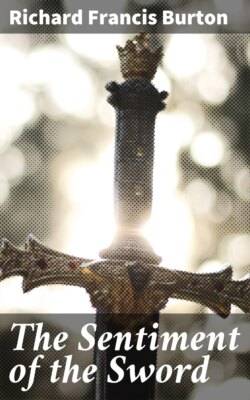Читать книгу The Sentiment of the Sword - Richard Francis Burton - Страница 7
На сайте Литреса книга снята с продажи.
II. Point and Edge amongst Ancients and Primitive Peoples
ОглавлениеTable of Contents
One evening, many strangers being in the smoking-room, our talk happened to touch upon the sword. Seaton was certain that the English would never be a fencing nation, that the Pointe wae the invention of modern Continental Europe, that the French school is the only system worth learning, and so forth the usual commonplaces of swordsmen.
I differed with him upon sundry details. It is hard to say what a nation cannot do; two centuries ago England could teach mueic to that all-claiming German race why should she not teach it again? The Greeks and Romans used the point, although their weapons were rather knives than " long knives," and the Turkish yataghan, the Malay kris, the Afghan "charay"[1] the Kabyle flissa[2], and the Algerian dagger, from which the Due D'Aumale borrowed the French sword-bayonet, are made for " thrust " as well as for "cut." We must not go beyond the assertion that only the exclusively pointed weapon, a revival of the old " stocco," that with which General Lamoriciere proposed to arm the French cavalry, is the invention of comparatively modern times. As regards the Italian schools, the old and the new, I supported their prowess in the field, and the aristocracy of the family from which they claim descent.
The discussion became animated enough to impress the general ear, despite the protestations of the schoolman and the objections of the cosmopolite. The many present who had never touched a foil were impressed with the halo of feelings which I threw round my favourite pursuit. They began to understand that mind or brain force enters, as well as muscle, into the use of the sword; that character displays itself even more than in the " bumps " of the phrenologists, or the lines of the physiognomist; and that every assault between experts, who despise the mere struggle of amour-propre, is a trial of skill and temper; of energy and judgment, of nerve, and especially of what is known as " coup d'oeil " and the " tact of the sword." Regarding nerve, I asserted that the same quality which makes an exceptionally good rider, marksman, or skater, a cricketer, tennis, or billiard player, to name no others, is required for the finished swordsman. Lastly, I proved, to my own satisfaction at least, that, although the man who would be a perfect master of fence must begin in boyhood, simple offence is easily, and defence is even more easily, taught. I fear, in fact, that my form of conversation became somewhat tectural, professorial, and dogmatic.
